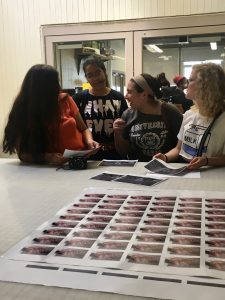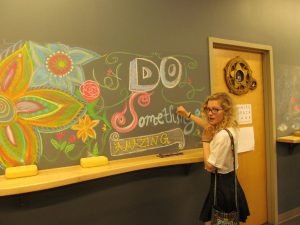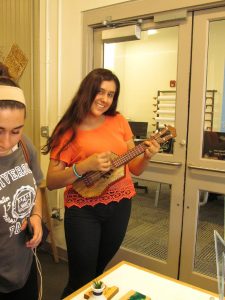Claudia Zavala (’20) will be blogging about her experiences as a member of the 2017 Digital Scholarship Summer Fellowship cohort.

Our first week is coming to a close and I couldn’t be happier to fill everyone in on what has been going on in the Digital Scholarship Summer Fellowship (DSSF). Walking into the Digital Media and Collaboration Lab on the first day of the program I really didn’t know what to expect. Although I understood the backbone of the Fellowship’s mission, there were still a lot of unanswered questions floating in my head. Yet from the very first day we had the opportunity to engage in profound discussion of what Digital Scholarship means and the diverse ways in which it manifests in creative scholarly research. In this first week alone, we have begun to create our personal portfolio websites, learned about OpenRefine, HTML and CSS, Arduino, physical computing, and some of the career opportunities available in front-end web development. Here are some highlights:
When speakers Zoey Bachmann (Code Academy Curriculum and Software Engineer) and Olivia Castello (Social Science Librarian) came to visit us on June 14th, I couldn’t help but be utterly amazed by the way in which they connected digital scholarship to their passions for activism, art history, anthropology, and statistics. Zoe discussed how digital scholarship not only allowed her to find an open, dynamic, and transformative platform for her voice, but also a space where she is constantly inspired to pursue and display new research projects. In a similar manner, Olivia’s passion for research and statistics has allowed her to enhance the research experience of many Bryn Mawr students.

Through learning about coding and data structure, DSSF is giving me the ability to connect on a deeper and personal level to computer programming. As part of this process, we experimented with hardware and physical computing through an open source electronics platform called Arduino. With this tool we tried out some fun assignments such as lighting up an LED light, composing a music beat, and creating a pseudo-theremin. As my partner Mimi and I worked on our projects, we couldn’t help but feel satisfied when we finally managed to make our button turn on the LED light bulb.

A final highlight of our first week at DSSF was our visit to the makers’ space NextFab, a place that provides manufacturing equipment, support, and education for the purpose of enabling community members in designing, prototyping, and polishing projects which would be difficult to accomplish otherwise. As we toured the space, I was blown away by its dynamic environment. On the first floor we were able to see large machines for clay and stone modeling, as well as different types of materials used by architects, sculptors, and landscapers. As we moved on to the second floor of the building, the setting changed completely. The smell of wood was replaced by that of coffee, while small discussions and the sounds of numerous designers working on computers took the place of the noise created by industry-grade equipment. We were able to witness firsthand how a new range of complex machines were used to create laser-cut objects (such as a ukulele) and detailed 3D models. Everywhere we turned we saw people actively working on projects as they tested and perfected their work. At the end of the tour we felt inspired to return to NextFab to work on some projects of our own.
Although I am a Cities major, I have come to realize how digital scholarship is more than just simply coding catered towards programming and design – my experiences during this first week have allowed me to understand how these tools can also serve as an extension of myself and my creativity. From the first day that I stepped foot into our lab, I knew that had become a part of a unique opportunity. After four weeks of training we will be able to create a project of our own in relation to the College Women collection, and I am excited and surprisingly unafraid. With the enthusiasm of our team and patience of our supervisors, I believe that our DSSF project has the potential to be amazing.